Key takeaways:
- Understanding telecommunication policy empowers consumers and professionals, shaping the digital landscape and access to services.
- Building strong relationships and trust among telecom stakeholders enhances collaboration, service delivery, and innovation.
- Engaging in casual interactions and celebrating successes fosters deeper professional connections and partnerships.
- Active listening and transparency, especially during challenges, are crucial for building trust and adapting to change in the telecom sector.
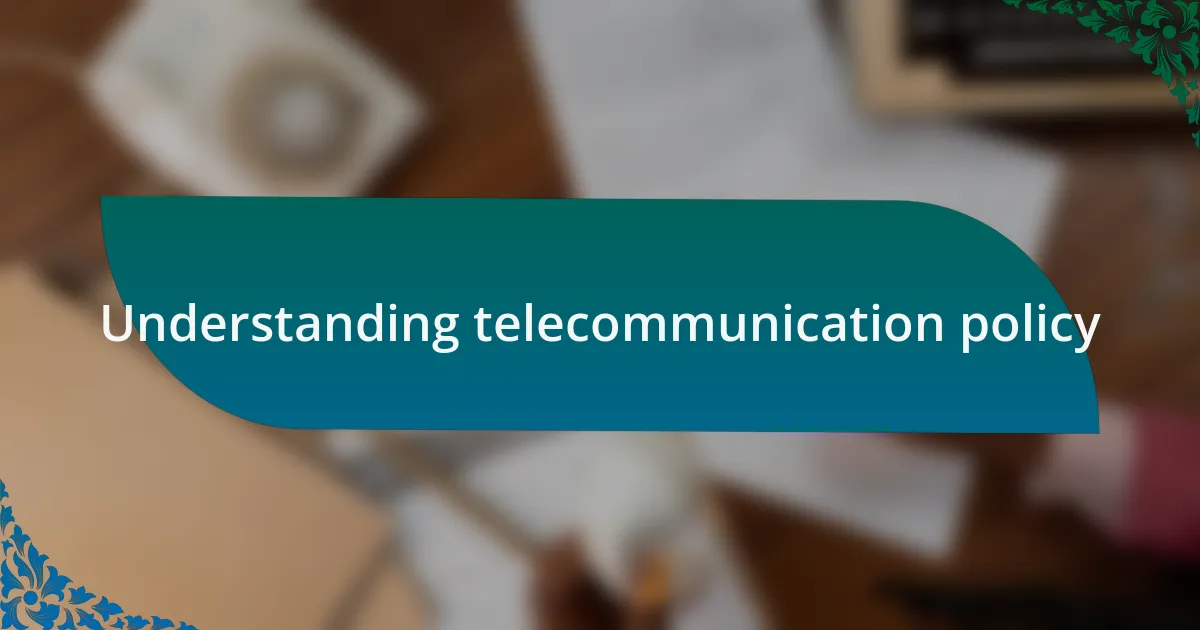
Understanding telecommunication policy
Understanding telecommunication policy is crucial for anyone involved in the field. I remember my first encounter with policy discussions; it felt like stepping into a world filled with complex regulations and technical jargon that seemed daunting at first. As I delved deeper, I realized these policies govern everything from consumer rights to infrastructure development, helping to shape the digital landscape we navigate daily.
Have you ever thought about how telecommunication policy impacts your daily life? Every time we connect through a call or a text, there’s a framework of rules and regulations that ensures those connections are reliable and fair. My experiences in the field have shown me that a solid understanding of these policies not only benefits professionals but also empowers consumers to advocate for their rights.
Navigating this landscape requires more than just knowledge; it demands an awareness of how these policies evolve. I’ve often found myself reflecting on how they adapt to technological advancements and societal shifts. This evolution is not merely academic; it affects everyone’s access to services and the quality of their communications. As I engaged with various stakeholders, I found that sharing insights into these dynamics fostered stronger relationships and a shared commitment to improving the telecommunication ecosystem.
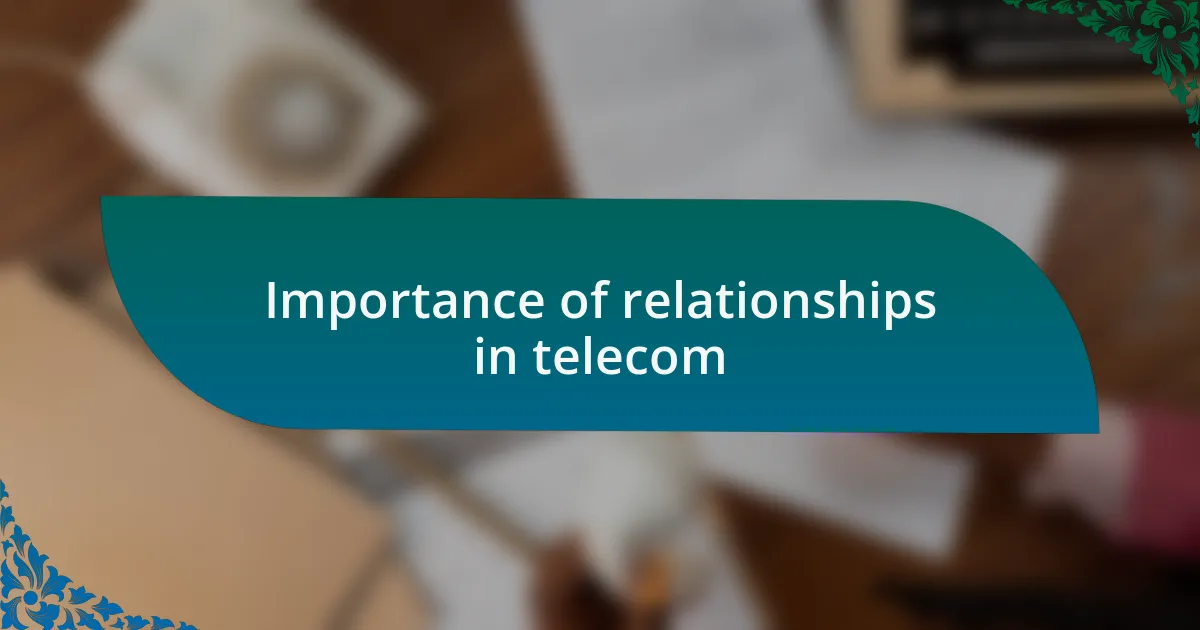
Importance of relationships in telecom
Building relationships in telecommunications is not just beneficial; it’s vital for success. I recall a pivotal moment when I attended a policy workshop and truly grasped the power of networking. Engaging in conversations with industry leaders opened my eyes to new perspectives and collaborative opportunities. Have you ever experienced the spark of innovation that occurs when like-minded individuals share ideas? Those connections can lead to groundbreaking solutions that aid the entire telecom ecosystem.
When you think about it, the telecom industry thrives on collaboration. I remember working on a project where a partnership with a regulatory body not only clarified compliance requirements but also enhanced our service delivery. This relationship proved that when stakeholders work together, the benefits extend far beyond individual goals. It’s through these alliances that we can tackle shared challenges and emerge stronger, making our work more impactful.
Moreover, relationships foster trust, which is essential in a sector marked by rapid change. Early in my career, I learned the importance of maintaining open lines of communication. A simple phone call to a colleague could resolve misunderstandings quickly, paving the way for mutual respect and long-term collaboration. How often do we underestimate the power of a genuine conversation? In my experience, it’s these relationships that transform a landscape filled with competition into one that thrives on cooperation.
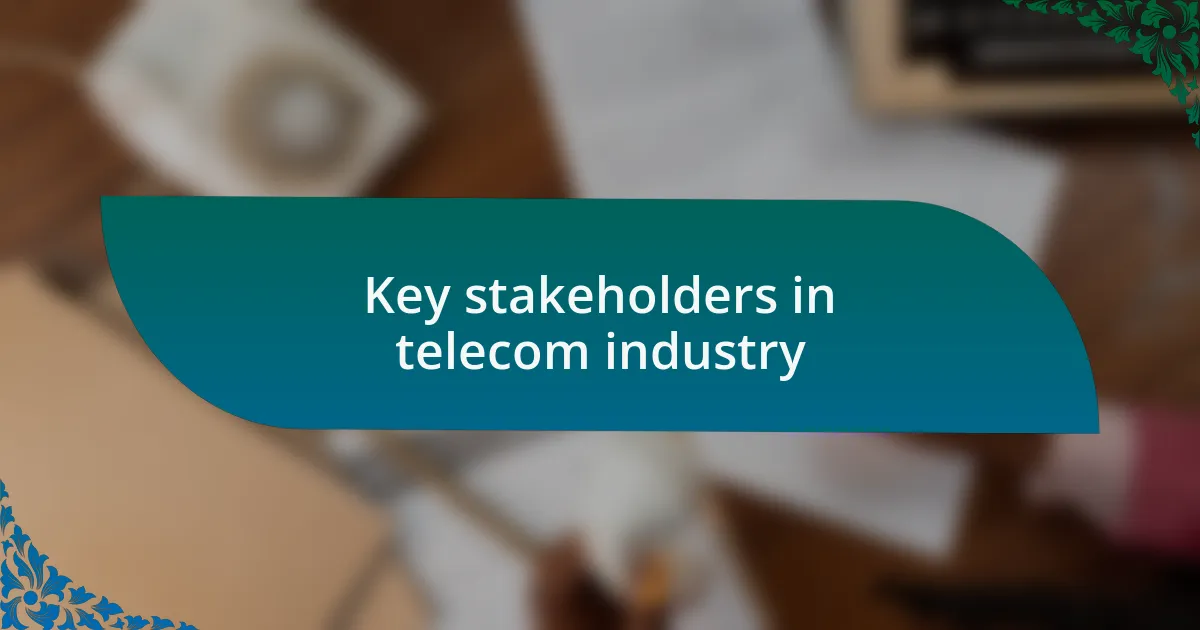
Key stakeholders in telecom industry
When discussing the key stakeholders in the telecom industry, it’s essential to consider various players, each with unique perspectives and interests. For instance, I vividly remember a meeting where representatives from telecom operators, government agencies, and consumer advocacy groups came together. Each voice contributed valuable insights, highlighting how collaboration among these stakeholders can lead to a more robust and user-friendly regulatory environment. Isn’t it fascinating how these different perspectives can create opportunities for innovative solutions?
Regulatory bodies play a critical role in shaping policies that impact the telecom landscape. I once had the opportunity to participate in a panel discussion with a key regulator who shared their experiences and challenges in enforcing compliance. It struck me how essential their role is in balancing industry growth with consumer protection. Have you ever considered how much smoother operations could be with a better understanding between regulators and telecom providers? This relationship is crucial for fostering an environment where innovation can flourish.
Finally, let’s not overlook the impact of technology vendors and infrastructure providers. I recall a project where a collaboration with a leading equipment manufacturer significantly improved our network reliability. Their insights into emerging technologies not only bolstered our service quality but also strengthened our position in the market. Isn’t it incredible how these partnerships can transform the competitive landscape and enhance service delivery for everyone involved? Each stakeholder brings something vital to the table, collectively shaping the future of telecommunications.
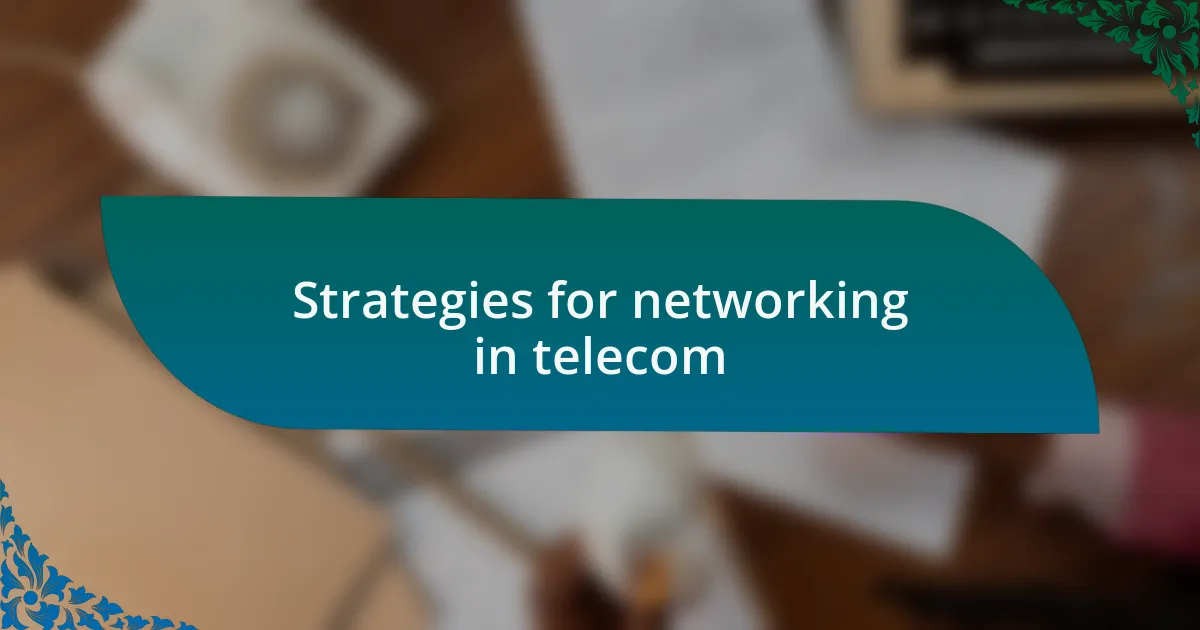
Strategies for networking in telecom
Building strong networks in the telecom sector requires deliberate strategies, one of which is attending industry conferences and seminars. I remember my first telecom expo; the energy was palpable as professionals shared insights and formed connections over shared interests. This face-to-face interaction not only helped me understand trending topics but also fostered relationships that proved invaluable in my career. Have you ever considered how personal interactions can often be more impactful than emails or phone calls?
Another effective strategy is leveraging online platforms, particularly professional networking sites. I’ve found that joining relevant groups on these platforms can lead to fruitful discussions and collaborations. Just last year, I connected with a telecom analyst on LinkedIn who later became a key advisor on a project I was working on. It’s amazing how a simple online interaction can evolve into a partnership that accelerates your professional growth, isn’t it?
Lastly, mentorship plays a crucial role in networking within telecommunications. I was fortunate to have a mentor who guided me through the complexities of the industry. Sharing experiences and advice not only deepened our relationship but also opened doors to opportunities I never would have encountered alone. How often do we underestimate the power of guidance from those who have walked the path before us?
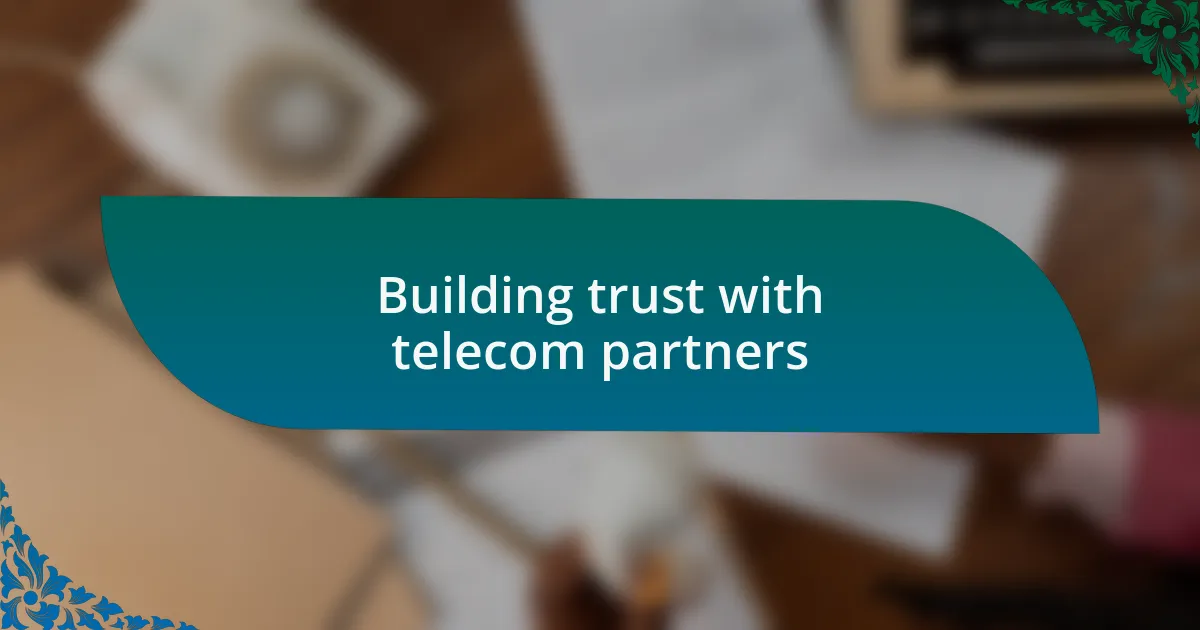
Building trust with telecom partners
Building trust with telecom partners takes time and consistent effort. I remember a situation where my team and I worked on a challenging project with a new vendor. Instead of merely focusing on deliverables, we invested time in understanding their work culture and challenges. This open dialogue helped us align our goals, fostering a sense of partnership that was built on mutual respect. Have you ever thought about how shared understanding can strengthen collaborative efforts?
One of the first steps in establishing trust is transparency. I’ve learned that being open about both successes and setbacks creates a safer environment for communication. There was an instance when we faced a delay in delivery; instead of masking the issue, I chose to address it head-on with the partner. By doing so, we were able to work collaboratively towards a solution, ultimately enhancing our relationship. It’s interesting how honesty can pave the way for stronger connections, don’t you think?
In my experience, consistent communication solidifies trust over time. I make it a habit to check in regularly with my partners, whether through calls or informal coffee meet-ups. I recall one particular partnership where these touchpoints led to an idea exchange that sparked an innovative project we hadn’t anticipated. It’s remarkable how investing in regular communication can open doors and build lasting trust, isn’t it?

Personal experiences in building relationships
Building relationships in the telecom sector often hinges on shared experiences. I remember attending a conference where I had the chance to engage with fellow professionals in a casual setting. Over a simple lunch, I found common ground with a partner who shared my frustrations about regulatory challenges. That moment of bonding not only led to deeper discussions but also forged a connection that transcended our professional roles. Have you ever found that a casual chat can lead to unexpected opportunities?
Emotions play a crucial role in relationship-building as well. There was a moment when our team faced significant pushback from stakeholders regarding a new policy initiative. Instead of retreating into official jargon, I chose to express my genuine concerns about potential impacts on our service quality. The vulnerability in my honesty resonated with our partners, allowing them to relate to our shared mission. It struck me how showing genuine emotion can transform business interactions into meaningful partnerships.
Lastly, I’ve learned the importance of celebrating successes together. After the successful rollout of a project, I organized a small gathering to recognize the contributions of everyone involved, including our partners. This simple gesture evoked a sense of belonging and pride, reinforcing our relationships. Have you considered how acknowledging achievements can deepen connections? It’s those moments of shared celebration that truly solidify the foundation of our partnerships.
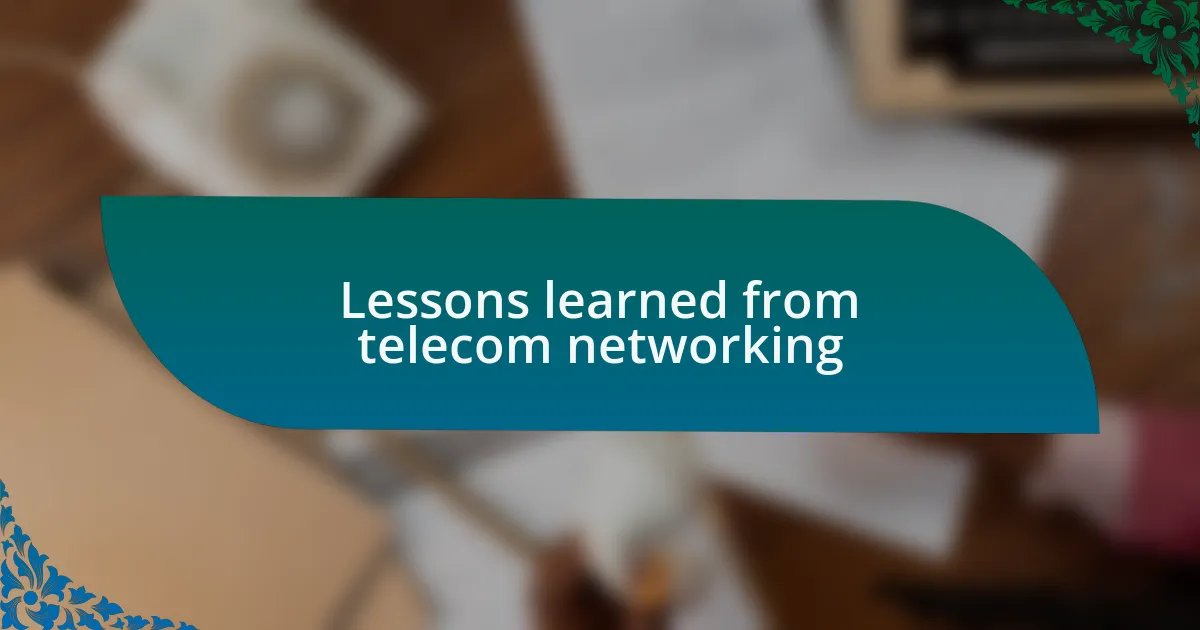
Lessons learned from telecom networking
Understanding the intricacies of telecom networking has taught me that adaptability is key. I remember a time when our network experienced unexpected outages, causing turmoil among clients. Rather than hiding behind technical explanations, I chose to be transparent, admitting our challenges while outlining our immediate response plan. This honesty not only alleviated customer anxiety but also built trust—a lesson that staying adaptable and open can cultivate stronger, more resilient relationships.
Another powerful lesson I’ve learned is the importance of listening actively. During a project kickoff meeting, a colleague voiced concerns about our approach to network security. Instead of brushing off the feedback, I took it to heart, leading us to refine our strategy and address potential risks. This not only improved the initiative but reinforced the value of diverse perspectives. How often do we prioritize our agendas over genuine conversations? I’ve found that fostering an environment where everyone feels heard greatly enriches our collaborative efforts.
Finally, I can’t stress enough the power of follow-up. After a major project launch, I made it a point to reach out personally to express gratitude to every team member and partner involved. This simple act of follow-up not only reinforced our connection but also opened up avenues for future collaborations. Have you ever considered how a brief message of thanks can lead to long-lasting partnerships? I’ve witnessed firsthand how these small gestures can leave a lasting impact on professional relationships.